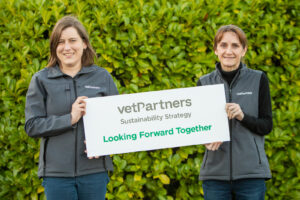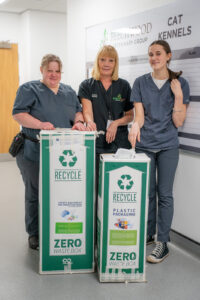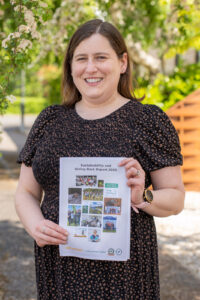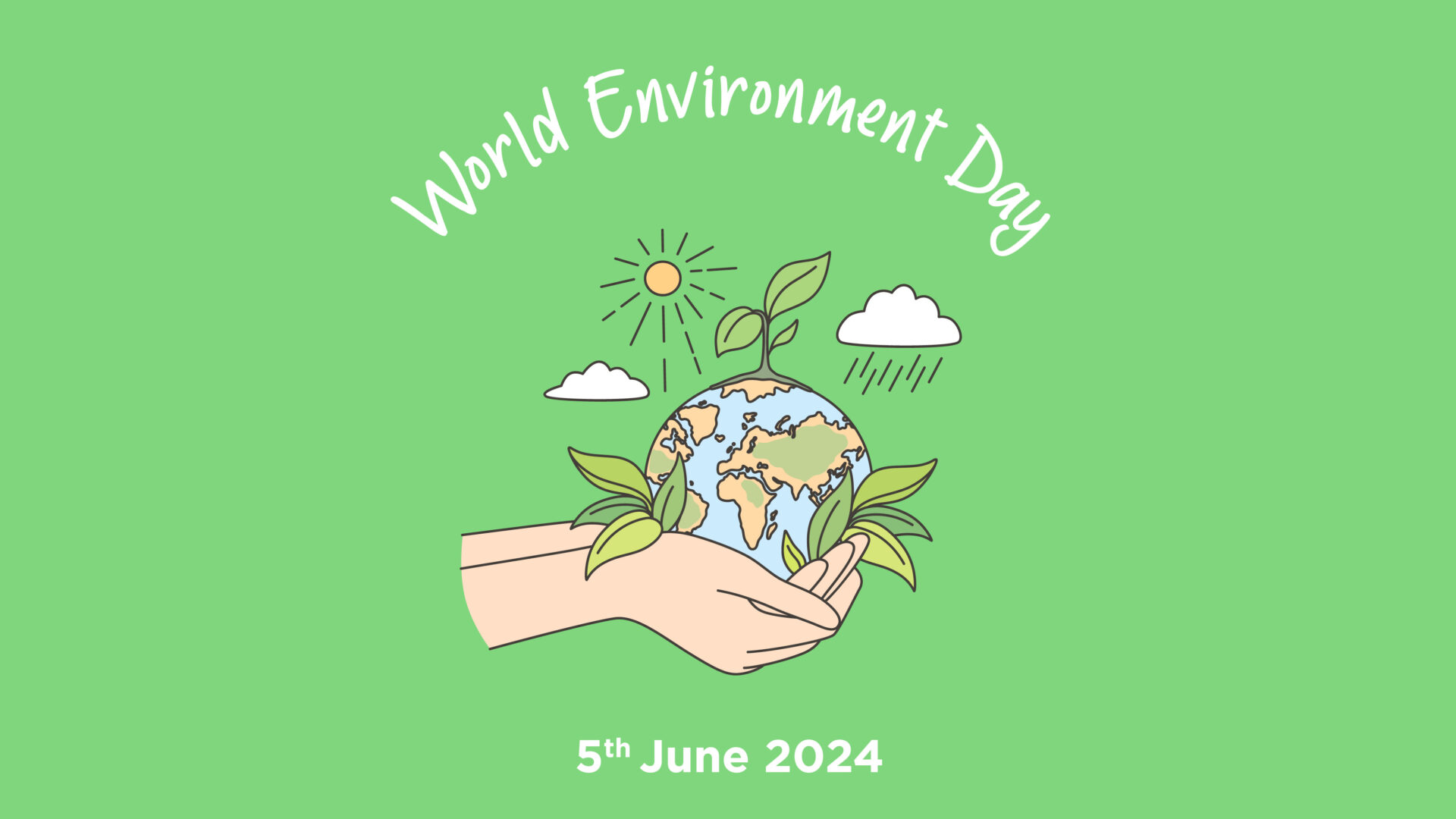 Reducing our environmental impact and tackling climate change is a challenging task.
Reducing our environmental impact and tackling climate change is a challenging task.
But the energy, passion and innovation of colleagues in our veterinary practices and animal healthcare companies has helped VetPartners achieve, and exceed, many of its sustainability goals.
As we mark World Environment Day, our Head of ESG Dr Hannah James reveals how connecting colleagues across Europe is making VetPartners a sustainability success….
WORLD Environment Day is a perfect opportunity to look back and reflect on the progress we are making at VetPartners.
In 2021, VetPartners produced its first Sustainability Strategy, with the aim of bringing together and enhancing the incredible work that colleagues were doing in practice, and providing support to help them achieve even more.
 Reviewing the strategy now, I’m struck by two things. The first is how far we’ve come. Some of the goals that felt lofty and daunting back then, like getting the majority of our veterinary practices onto renewable energy tariffs and raising £50,000 a year for charity, are now far in the rear-view mirror as we’ve surpassed them and replaced them with more ambitious targets.
Reviewing the strategy now, I’m struck by two things. The first is how far we’ve come. Some of the goals that felt lofty and daunting back then, like getting the majority of our veterinary practices onto renewable energy tariffs and raising £50,000 a year for charity, are now far in the rear-view mirror as we’ve surpassed them and replaced them with more ambitious targets.
It can be easy to get lost in the day-to-day details and feel that not much progress is being made, but taking time to look back can show us just how much we’ve done over the last few years.
The other thing I’m struck by is that the strategy feels somehow small. Like a favourite t-shirt from childhood, or – more aptly – a puppy collar, it’s served us well, but maybe we’ve outgrown it now. The targets we set run from 2021 to 2026, but here in 2024 some of them are starting to feel outdated.
There’s a reason for that of course – today, VetPartners has 12,000 employees working in more than 700 sites in the Channel Islands, France, Germany, Ireland, Italy, the Netherlands, Portugal, Spain, Switzerland and the UK. While our core values and mission have stayed the same, in many ways VetPartners is very different to the company that it was in 2020.
However, it’s not just the changes to the company’s size and structure that make our first strategy feel outdated, it’s the changes to our knowledge and understanding as well.
What did we learn?
Of course, you can’t talk about this period without discussing what was perhaps the biggest change event and learning experience in most people’s living memory: the covid pandemic. It was a seismic event which impacted almost every area of life. One unexpected effect of covid was that it gave rise to one of our UK sustainability initiatives which is still going strong: recycling with TerraCycle.
 In late 2020 as our clinical teams battled with carpark consults, the ‘pandemic puppy’ boom and ever-changing public health guidelines, morale was not being helped by the need to dispose of huge quantities of masks, gowns and gloves – none of which were recyclable via the usual channels. Our search for a solution to this led us to TerraCycle’s Zero Waste Boxes™: a service specialising in recycling ‘difficult’ materials like flexible plastic gowns and gloves and the plastic-based fabrics that make up single-use masks. Nearly four years on, practices are still using the PPE boxes (albeit in smaller quantities), and we’ve also added boxes for plastic packaging, medication blister packs and pet food pouches to the scheme.
In late 2020 as our clinical teams battled with carpark consults, the ‘pandemic puppy’ boom and ever-changing public health guidelines, morale was not being helped by the need to dispose of huge quantities of masks, gowns and gloves – none of which were recyclable via the usual channels. Our search for a solution to this led us to TerraCycle’s Zero Waste Boxes™: a service specialising in recycling ‘difficult’ materials like flexible plastic gowns and gloves and the plastic-based fabrics that make up single-use masks. Nearly four years on, practices are still using the PPE boxes (albeit in smaller quantities), and we’ve also added boxes for plastic packaging, medication blister packs and pet food pouches to the scheme.
Since we started using TerraCycle, we’ve diverted 18.4 tonnes of waste from incineration or landfill: an unexpected silver lining from a terrible situation, and not bad for an initiative that didn’t even figure into our initial sustainability strategy.
 We also learned that veterinary practices are fertile ground for sustainability action and advocacy: the combination of a scientific education, interest in animal welfare and a tendency towards energetic dispositions makes practitioners ideal environmental activists and change-makers.
We also learned that veterinary practices are fertile ground for sustainability action and advocacy: the combination of a scientific education, interest in animal welfare and a tendency towards energetic dispositions makes practitioners ideal environmental activists and change-makers.
This energy and dedication has translated into action across Europe: sustainability CPD for farm vets, reductions in the use of nitrous oxide, research projects, beach cleans, litter picks… the number of actions that colleagues have taken is huge.
Following our European growth, it has been a huge privilege to meet and learn from colleagues in all of the different countries we now operate in, and to discover that concern for the environment and enthusiasm for positive change is universal – along with the ‘can do – and let’s do it now’ attitude.
Our European colleagues have taken our UK sustainability guides and made them their own: not just translating and localising them, but finding innovative new ways to communicate – like the team in Spain, who created a checklist and printed it onto fridge magnets so every practice could have a handy visual reminder. And across the whole group, people have embraced our partnership with conservation charity World Land Trust (WLT) and their Buy an Acre scheme. Under the scheme, WLT and their partners purchase one acre of habitat for every £100 (€117 / CHF115) raised and protect it for wildlife in perpetuity. This was the first charity that we chose to support as a whole group, and it felt like a natural choice for us. Our colleagues care deeply about animal welfare, and that extends to concern for wild animals and the habitats they rely on. A truly global charity, WLT work internationally but consider the local nuances and needs of each region they work in: partnering with local organisations to ensure socially – as well as environmentally – sustainable outcomes.
 Since we partnered with WLT in 2022, we have helped them to purchase and protect 527 acres of land (equivalent to around 300 football pitches). Fundraising events have included the Italian team’s conference stand, a CPD event for veterinary nurses in France, and the hugely popular Month of Movement, which sees colleagues in every country getting active for charity. Coming together to protect these acres of land feels like a good metaphor for the company as a whole: combining our resources from across different countries to create a positive outcome.
Since we partnered with WLT in 2022, we have helped them to purchase and protect 527 acres of land (equivalent to around 300 football pitches). Fundraising events have included the Italian team’s conference stand, a CPD event for veterinary nurses in France, and the hugely popular Month of Movement, which sees colleagues in every country getting active for charity. Coming together to protect these acres of land feels like a good metaphor for the company as a whole: combining our resources from across different countries to create a positive outcome.
Moving forward as a European family
So where do we go from here? Our original targets ran from 2021 to 2026, but in light of how VetPartners has grown and how much we’ve learned, it’s time for a refresh.
 Our new Sustainability and Giving Back strategy will take a more collaborative and cross-border approach, taking account of future growth and change. In late 2024 or early 2025 we’ll be setting net zero targets: committing to reaching net zero greenhouse gas emissions by 2050 or earlier. As we make a plan for how to achieve these targets, we have an ideal opportunity to refresh our plans for environmental and social sustainability in all areas, incorporating what we’ve learned over the last few years. We’ll make sure that all colleagues have the opportunity to voice their ideas, and put more focus on initiatives that can be shaped and led by colleagues working in practice. We’ll also ensure a joined-up approach, for example with a net zero working group with representatives from all the countries we work in.
Our new Sustainability and Giving Back strategy will take a more collaborative and cross-border approach, taking account of future growth and change. In late 2024 or early 2025 we’ll be setting net zero targets: committing to reaching net zero greenhouse gas emissions by 2050 or earlier. As we make a plan for how to achieve these targets, we have an ideal opportunity to refresh our plans for environmental and social sustainability in all areas, incorporating what we’ve learned over the last few years. We’ll make sure that all colleagues have the opportunity to voice their ideas, and put more focus on initiatives that can be shaped and led by colleagues working in practice. We’ll also ensure a joined-up approach, for example with a net zero working group with representatives from all the countries we work in.
My favourite part of my job is connecting with colleagues and hearing about the brilliant things they’ve done in their practices or workplaces to reduce environmental impacts, contribute to amazing causes locally, nationally and globally, and test or implement better ways of working. Change is the only real constant in life, and as we respond to changes both external and internal, I’m excited to see what we can achieve as we continue looking forward together.
Dr Hannah James is Head of Environment, Social and Governance at VetPartners, where she leads the Sustainability team and oversees environmental compliance and charitable activities.
Hannah recently acted as ‘module champion’ for Vet Sustain’s Sustainability In Practice course, and in her spare time volunteers for environmental conservation and rewilding charity The Lifescape Project.
She previously worked at Yorkshire Water as Lead Sustainability Advisor and served on BSI’s expert committee for ISO14007: Determining Environmental Costs and Benefits – acting as UK delegate to the international working group.
Hannah has a PhD and MSc in Low Carbon Technologies from the University of Leeds and a BSc in Environmental Sciences from the University of East Anglia.

